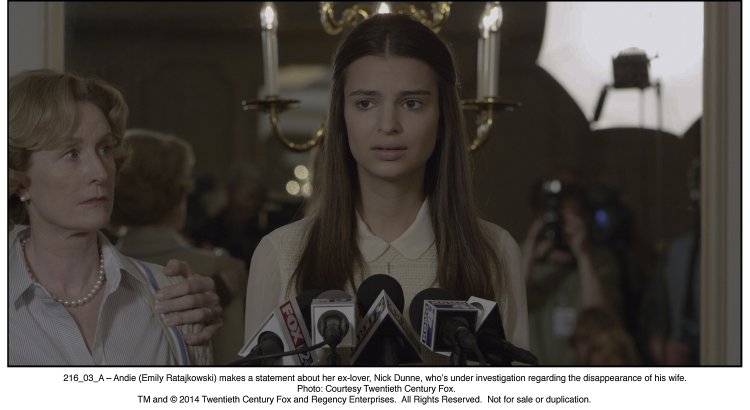Gone Girl (2014)
"Gone Girl," directed by David Fincher and released in 2014, is a gripping and suspenseful thriller that delves into the complexities of marriage, deception, and the darker aspects of human nature. With its masterful storytelling, compelling performances, and thought-provoking exploration of identity and media manipulation, the film keeps viewers on the edge of their seats from start to finish.

Intriguing Plot and Narrative Structure
At the heart of "Gone Girl" is a captivating and intricately woven plot. The film follows the disappearance of Amy Dunne (played by Rosamund Pike) and the ensuing investigation into her husband Nick (played by Ben Affleck). The narrative unfolds through a dual perspective, showcasing the different sides of the story and keeping audiences guessing about the truth. The twists and turns in the plot create a sense of unease and anticipation, making it an engrossing cinematic experience.
Complex Characters and Performances
The performances in "Gone Girl" are outstanding, with Rosamund Pike delivering a career-defining performance as Amy Dunne. Pike effortlessly portrays the complexities of her character, capturing both vulnerability and a chilling sense of manipulation. Ben Affleck brings depth and nuance to his portrayal of Nick, a character trapped in a web of suspicion and public scrutiny. The supporting cast, including Neil Patrick Harris and Carrie Coon, also deliver strong performances, adding layers to the intricate web of relationships.
Examination of Marriage and Gender Roles
One of the central themes of "Gone Girl" is the examination of marriage and the roles of men and women within a relationship. The film explores the dynamics of power, control, and the expectations placed upon individuals in a marriage. It challenges traditional gender roles and raises questions about the complexities of intimacy and trust. Through the character of Amy, the film offers a subversive and thought-provoking exploration of societal expectations and the masks people wear in their relationships.
Media Manipulation and Public Perception
"Gone Girl" delves into the influence of media and public perception on the course of events. It critiques the sensationalism and voyeurism of the media, highlighting how public opinion and media narratives can shape the outcome of high-profile cases. The film exposes the dark side of media scrutiny, examining the power dynamics between the public, the press, and those caught in the spotlight.
Dark and Unsettling Atmosphere
David Fincher's masterful direction creates a dark and unsettling atmosphere throughout the film. The meticulous attention to detail, the moody cinematography, and the use of a haunting musical score all contribute to the film's chilling ambiance. The atmosphere enhances the suspense and tension, amplifying the psychological impact of the narrative.
Cultural Impact and Critical Acclaim
"Gone Girl" made a significant impact upon its release, captivating audiences and garnering critical acclaim. It sparked discussions about the complexities of relationships, the portrayal of gender in media, and the power of manipulation. The film's success solidified David Fincher's reputation as a master of suspense and established "Gone Girl" as a modern thriller classic.
Also Check CANDYMAN - Dare to say his name
Conclusion
"Gone Girl" is a riveting and thought-provoking thriller that masterfully explores themes of marriage, deception, and the darker aspects of human nature. With its intriguing plot, complex characters, and examination of media manipulation, the film keeps viewers engaged and on the edge of their seats. David Fincher's meticulous direction and the exceptional performances by the cast create a gripping and unforgettable cinematic experience. "Gone Girl" stands as a testament to the power of storytelling and the exploration of the complexities of human relationships in the modern age.




























